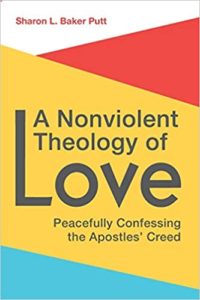Baker-Putt. A Nonviolent Theology of Love: Peacefully Confessing the Apostles Creed. Fortress Press, 2021. ISBN 9781506424934
I really like this introduction to Christian theology—it was one of the books I required my students to read the last time I taught a course on the topic. The author writes from a Peace Church and relational perspective and affirms open theism.
A key theme of the book is God is a loving being who enters into dynamic relationships with creatures and empowers them to love others as Jesus did. This theme is used to explore the traditional theological loci around the Apostle’s Creed. She uses a Christocentric approach along with the Wesleyan quadrilateral.
The integration of doctrine and ethics is very helpful. She says the purpose of theology is to help people live out the Christian life together. I thought the chapters on the Trinity and atonement were extremely well done.
The chapter on the divine attributes affirms divine passibility and says that although God’s faithfulness never changes, God does have changing emotions and relationships “because authentic relationships require the dynamics of change, the give-and-take type of relationality that responds to the other” (69).
Regarding omniscience, she says “God knows everything God will do. But the scriptural witness indicates that God does not know what we will choose to do before we choose it” (70). “God knows everything that can be known, such as God’s plans for salvation history and the choices we have before us, including the consequences for each of those choices” (71).
“But what does this type of knowledge look like? Picture a web with God in the middle. Every strand of the web is a choice that each person has to make. Extending off each strand is another strand that represents all the consequences for each choice; every consequence produces more choices, which then produce more consequences. What a complicated and tangled web we weave! Now multiply our webs of choices and consequences by billions and billions of people who all have their own webs. And God knows it all—every set of choices put before us (but not which choice we will make) and every consequence based on the choices we could make. Not only that, but God knows how God will respond to every single choice and consequence so that when we do choose, God knows how God will respond” (71). This sounds very much like Greg Boyd’s position.
“Does the Hebrew/biblical view believe in God’s omniscience? Yes. God knows all of God’s plans to bring about the redemption of all creation. Is God omniscient? In a certain sense, no. God gives us authentic freedom to make potential choices and responds to us as those choices become actualities” (71). I encourage open theists not to word things this way. Instead, we should say that God is fully omniscient (I prefer the term “dynamic omniscience”) in that God knows all that is knowable at any moment.
Nonetheless, I’m delighted to have an introduction to Christian theology written from an open and relational position.

